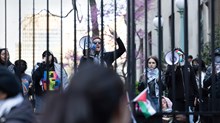Update (Aug. 5): World Watch Monitor (WWM) reports that Christians in Madhya Pradesh still are waiting to hear whether or not the government will accept their amendments to the state's new 'anti-conversion law', the signing of which has been placed on hold.
According to WWM, the bill needs to be ratified by governor Ramnaresh Yadav, a member of the ruling, hardline-Hindu Bharatiya Janata Party (BJP). However, "local sources told World Watch Monitor that proceedings were halted on July 11, while the opposition prepared a no-confidence motion against the present BJP government."
-----
Converting to Christianity? Don't forget to ask your local government officials for permission first—at least one month in advance.
That is, if you live in the Indian state of Madhya Pradesh state, which has passed legislation sending converts to Christianity—and their pastors—to prison for failing to obtain such permission before conversions.
The bill requires the governor's signature before becoming law. Existing law in Madhya Pradesh requires those who convert to notify government officials after conversion; the new legislation not only requires prior permission but also obligates religious leaders to report the conversions, and it increases prison terms from one to three years for clergy and converts who fail to do so.
With India already on a "watch list" of the U.S. Commission on International Religious Freedom, India's Christians were aghast at the bill's level of interference in private personal belief.
"These laws are political gimmicks used to polarize voters along religious lines – it is common knowledge that these laws have already been misused to terrorize the minority Christian community across the country," said Tehmina Arora, an attorney for Alliance Defending Freedom India.
The bill is an amendment to Madhya Pradesh's existing "anti-conversion" law of 1968. Ironically called "Freedom of Religion Acts," such laws forbid forcible or fraudulent conversions, but Hindu nationalists have used them to arrest and harass Christians with false accusations.
Indira Iyengar, president of the Madhya Pradesh Christian Association, said the association has written to state Gov. Ram Naresh Yadav and other officials urging them to reject the amendment bill. The governor's post is largely ceremonial, and Chief Minister Shivraj Singh Chouhan holds most executive powers.
In its memorandum, the association stated that the bill not only contradicts various Articles of the Constitution of India but also violates states' obligations under the U.N. Universal Declaration of Human Rights and the International Covenant on Civil and Political Rights. Such legislation will create religious tensions, the association stated, urging the governor to protect the rights of religious minorities.
The Hindu extremist BJP proposed and passed the legislation with little discussion. Party and state officials have been strangely silent on the proposal, and none was willing to comment to Morning Star News.
Another Indian state, Himachal Pradesh, had an "anti-conversion" law from 2006 requiring prospective converts to give prior notice, but the state high court last August ruled it unconstitutional in response to a petition filed by the ADF-backed Evangelical Fellowship of India.
Under the law, a prospective convert's intentions had been subject to a mandatory state inquiry.
The high court recognized that the provisions violated the fundamental right of privacy safeguarded under the right to life in the India Constitution.
"A person's belief or religion is something very personal to him," the court ruled. "The state has no right to ask a person to disclose what is his personal belief. The only justification given is that public order requires that notice be given. We are of the considered view that in case of a person changing his religion and notice being issued to the so-called prejudicially affected parties, chances of the convertee being subjected to physical and psychological torture cannot be ruled out. The remedy proposed by the state may prove to be more harmful than the problem."
CT regularly reports on anti-conversion laws, which the United Nations has identified as the "most troubling" violation of human rights, including the recent court victory by Christians in Himachal Pradesh, India's most Hindu state. CT also reported when the BJP finally lost its longheld power in Karnatka, India's most persecuting state, in recent elections. Meanwhile, Indian Christians and Christian tourists continue to face violence over conversion allegations, in a country with an undetermined future for religious minorities.

Support Our Work
Subscribe to CT for less than $4.25/month


















